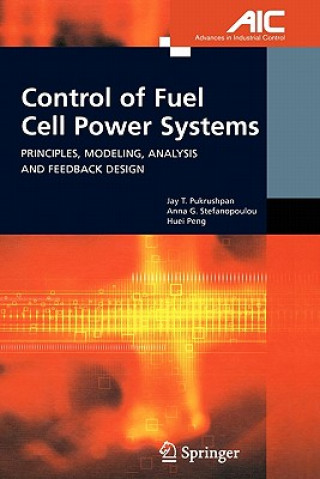
Doručení
Nákupní rádce





Nehodí se? Vůbec nevadí! U nás můžete do 30 dní vrátit
 Dárkový poukaz
V libovolné hodnotě
Dárkový poukaz
V libovolné hodnotě
S dárkovým poukazem nešlápnete vedle. Obdarovaný si za dárkový poukaz může vybrat cokoliv z naší nabídky.
Control of Fuel Cell Power Systems
 Angličtina
Angličtina
 539 b
539 b
30 dní na vrácení zboží
Mohlo by vás také zajímat


The problem of greenhouse gas (particularly carbon dioxide) release during power generation in fixed and mobile systems is widely acknowledged. Fuel cells are electrochemical devices offering clean and efficient energy production by the direct conversion of gaseous fuel into electricity. As such, they are under active study for commercial stationary power generation, residential applications and in transportation. The control of fuel cell systems under a variety of environmental conditions and over a wide operating range is a crucial factor in making them viable for extensive use in every-day technology. §In Control of Fuel Cell Power Systems the application of fuel cells in automotive powertrains is emphasized because of the significance of the contribution to global CO2 emissions made by ground vehicle propulsion and because of the challenge presented by the accompanying control problems. The authors comprehensive control-oriented approach provides: An overview of the underlying physical principles and the main control objectives and difficulties associated with the implementation of fuel cell systems. System-level dynamic models derived from the physical principles of the processes involved. Formulation, in-depth analysis and detailed control design for two critical control problems, namely, the control of the cathode oxygen supply for a high-pressure direct hydrogen fuel cell system and control of the anode hydrogen supply from a natural gas fuel processor system. Multivariable controllers that attenuate restraints resulting from lack of sensor fidelity or actuator authority. Real-time observers for stack variables that confer redundancy in fault detection processes. Examples of the assistance of control analysis in fuel cell redesign and performance improvement. Downloadable SIMULINK® model of a fuel cell for immediate use supplemented by sample MATLAB® files with which to run it and reproduce some of the book plots. §Primarily intended for researchers and students with a control background looking to expand their knowledge of fuel cell technology, Control of Fuel Cell Power Systems will also appeal to practicing fuel cell engineers through the simplicity of its models and the application of control algorithms in concrete case studies. The thorough coverage of control design will be of benefit to scientists dealing with the electrochemical, materials and fluid-dynamic aspects of fuel cells. §Advances in Industrial Control aims to report and encourage the transfer of technology in control engineering. The rapid development of control technology has an impact on all areas of the control discipline. The series offers an opportunity for researchers to present an extended exposition of new work in all aspects of industrial control.Presenting the latest research in the control of fuel cell technology, this book will contribute to the commercial viability of the technology. The authors background in automotive technology gives the work added authority as a vital element of future planning.The problem of greenhouse gas (particularly carbon dioxide) release during power generation in fixed and mobile systems is widely acknowledged. Fuel cells are electrochemical devices offering clean and efficient energy production by the direct conversion of gaseous fuel into electricity. As such, they are under active study for commercial stationary power generation, residential applications and in transportation. The control of fuel cell systems under a variety of environmental conditions and over a wide operating range is a crucial factor in making them viable for extensive use in every-day technology. §In Control of Fuel Cell Power Systems the application of fuel cells in automotive powertrains is emphasized because of the significance of the contribution to global CO2 emissions made by ground vehicle propulsion and because of the challenge presented by the accompanying control problems. The authors comprehensive control-oriented approach provides: An overview of the underlying physical principles and the main control objectives and difficulties associated with the implementation of fuel cell systems. System-level dynamic models derived from the physical principles of the processes involved. Formulation, in-depth analysis and detailed control design for two critical control problems, namely, the control of the cathode oxygen supply for a high-pressure direct hydrogen fuel cell system and control of the anode hydrogen supply from a natural gas fuel processor system. Multivariable controllers that attenuate restraints resulting from lack of sensor fidelity or actuator authority. Real-time observers for stack variables that confer redundancy in fault detection processes. Examples of the assistance of control analysis in fuel cell redesign and performance improvement. Downloadable SIMULINK® model of a fuel cell for immediate use supplemented by sample MATLAB® files with which to run it and reproduce some of the book plots. §Primarily intended for researchers and students with a control background looking to expand their knowledge of fuel cell technology, Control of Fuel Cell Power Systems will also appeal to practicing fuel cell engineers through the simplicity of its models and the application of control algorithms in concrete case studies. The thorough coverage of control design will be of benefit to scientists dealing with the electrochemical, materials and fluid-dynamic aspects of fuel cells.
Informace o knize
 Angličtina
Angličtina




 Jak nakupovat
Jak nakupovat
































